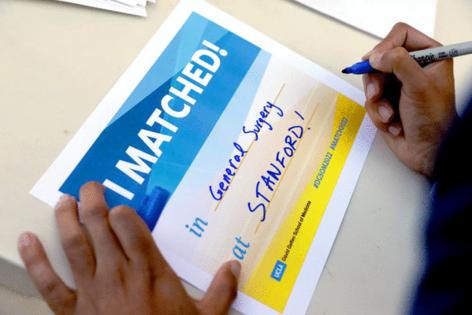Commentary: How Trump could make it harder for you to see a doctor
Published in Health & Fitness
The Trump administration’s One Big Beautiful Bill Act puts so many people at risk of losing their health insurance and food assistance, it’s hard to focus on other fires set by the new law. And yet — there’s one crucial conflagration I hope the state of California will fight.
The budget bill contains multiple changes in federal student loan programs that will make it harder for many students to even think about getting an undergraduate degree at the University of California or at Cal State. Eligibility for Pell Grants and other loans and grants, the way repayment works, and annual and lifetime limits on borrowing by students and their parents (via Parent PLUS loans) are all changing.
But let me narrow my focus to students enrolling in law, medical, pharmacy or other professional schools, the segment of the student “market” I’m most familiar with because of my career as a professor at UC Law San Francisco.
When I started teaching, the citizens of California very generously supported professional training. I recall that tuition at UC Law (then UC Hastings) was — well, there was no tuition, just fees.
But with dramatically reduced public support over the years, the costs have gone up and up. Tuition and required fees alone at UC Law SF are about $60,000 a year. At medical, dental or pharmacy school? In the $50,000 to $60,000 range as well. And that’s without food, housing and other expenses of daily living. (For perspective, UC’s tuition costs are still less expensive than private schools: At Stanford Law School tuition will set you back about$77,000 a year and at Stanford School of Medicine, $67,000.)
Under the OBBBA, professional-school students will no longer be able to get more than $50,000 a year (up to $200,000 total for a degree) in federal student loans. That leaves a significant gap in annual tuition and fees, and offers no help on the additional costs — UC calculates the total cost for one year of dental school at $104,000.
There are private loans available. But federal student loans have more flexibility, particularly in repayment plans, and students need neither a strong credit history nor a co-signer to get them. The students who would need to borrow the most are the least likely to have a strong credit history or a family member who would be an acceptable co-signer for a private loan. And private loan rates are almost always higher than the government’s.
So just as the tax provisions in this newly passed law make the rich richer, I fear the student loan provisions will be adequate for the better off but prevent many working-class young people from obtaining professional degrees. So much for policies that support the American dream.
California could control this fire through its own student loan program, adding funding to fill the gap created by the new federal rules. One option: Create an additional program under the auspices of the California Student Aid Commission, whose current aid programs are limited in scope. It’s true that the state budget is already stretched thin — but this is about loans, so the money will, for the most part, be returned with interest.
Do we need to be helping future professionals get an education? Absolutely!
As our population ages, the demands for health professionals are only increasing. Given the long trajectory of medical, nursing and pharmacy students’ education, we can’t wait for another administration to come into office and fix the loan situation. We should prevent a reduction in the numbers of practitioners graduated now. We already have shortages of health professionals: Have you tried recently to find a primary care physician or pediatrician who is taking new patients? And the nurse shortage is a major problem — UC San Francisco estimates the state is short 36,000 nurses.
As for lawyers, if you doubt the need for more, consider “ the justice gap.” Facing eviction? Have problems with an employer? Unable to access public benefits? Suffering domestic violence? There are not nearly enough legal aid lawyers to help, leaving many at a great disadvantage.
And the young people most likely to find the new federal loan rules a barrier to law school are also likely to best understand the need for more lawyers in public interest and public service jobs, and perhaps the most likely to aspire to such jobs. The state has had a loan repayment program for those who practice public interest law. In addition to bolstering federal student loans with state loans, California could reinvigorate and expand the repayment program to cover a greater variety of jobs and to repay more than the $11,000 limit.
While the federal government is acting to burn things down, our state should intervene to build things up, including the talent pool we need for the decades ahead.
____
Marsha Cohen, emerita professor of law at UC Law San Francisco, twice served as the school’s dean of admissions, which included supervising its financial aid program.
©2025 Los Angeles Times. Visit at latimes.com. Distributed by Tribune Content Agency, LLC.










Comments